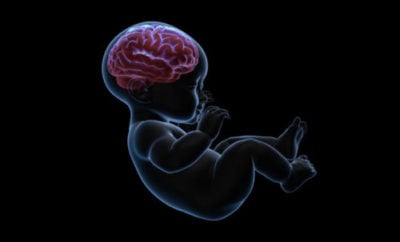A new study has found that alcohol use during pregnancy can affect a woman’s immune system in ways that may predict her child’s neurodevelopmental outcome. Specific changes in a mother’s immune system can also serve as an indicator of prenatal alcohol use. Prenatal alcohol use can cause an array of health effects in offspring, collectively called fetal alcohol spectrum disorders (FASD). The most profound effects of prenatal alcohol exposure are brain damage and the resulting impairments in behavioral and cognitive functioning. These deficits can contribute to learning disabilities, problems holding a job, and poor social skills throughout a person’s life.
Cytokines are immune system messengers that help to control immune responses and play an important role in brain development. Alterations in the maternal immune system during pregnancy can result in changes in the cytokine balance of the fetus, thus affecting typical brain development. For example, alterations in maternal immune system molecules have been linked to childhood neurodevelopmental disorders such as autism and schizophrenia.
The Collaborative Initiative on Fetal Alcohol Spectrum Disorders (CIFASD), supported by the National Institute on Alcohol Abuse and Alcoholism, recently found that alcohol consumption disrupted the levels of eight maternal cytokines that may influence the risk for FASD. The Fall 2018 issue of NIAAA Spectrum reported on the results of that study in “Maternal Cytokine Balance May Play Role in FASD Risk.” The present study extended this work. Cytokines do not act individually but, rather, are part of functional networks involving many other kinds of molecules. A CIFASD research team led by Joanne Weinberg, Ph.D., at the University of British Columbia evaluated a panel of 40 cytokines and related factors. They analyzed individual cytokines as well as networks of interacting cytokines. The goal was to identify maternal immune profiles predictive of alcohol intake and child neurodevelopmental outcomes.
In collaboration with Christina Chambers, Ph.D., at the University of California San Diego, researchers enrolled pregnant women who reported “moderate to heavy” alcohol consumption or “low to no” alcohol consumption during pregnancy. Blood samples were collected from these women during the second and third trimesters of pregnancy, and their children were evaluated at ages 6 months and 12 months for physical and neurodevelopmental features typically associated with FASD.
Researchers identified distinct networks of activated and inhibited cytokines that were associated with whether women consumed alcohol during pregnancy and whether the children showed neurodevelopmental delay. Certain cytokines and growth factors were elevated in mothers who engaged in moderate to heavy alcohol consumption and had children with neurodevelopmental delay. Importantly, mothers who engaged in moderate to heavy alcohol consumption but whose children were without neurodevelopmental delay had a different cytokine profile, and the networks in both groups differed from the networks of the group of women who had low to no alcohol consumption.
These findings suggest that the maternal immune profile during pregnancy may be predictive of child risk for, and resilience to, the adverse effects of alcohol on neurodevelopment, potentially serving as a biomarker to facilitate early identification of children at risk for neurodevelopmental delay.
For more information about CIFASD, please visit https://cifasd.org.
Note: In this study, moderate to heavy alcohol consumption was defined as at least weekly binge drinking episodes (5 or more drinks), at least 5 occurrences of 3–4 standard drinks, or at least 10 occurrences of 1–2 standard drinks, either in the month of conception or in the most recent month of pregnancy. Low to no alcohol consumption was defined as no binge episodes, minimal or no alcohol in the month around conception, and no drinking in the most recent month of pregnancy.
References:
NIAAA. Maternal cytokine balance may play role in FASD risk. NIAAA Spectrum 10(3):6, 2018.
Sowell, K.D.; Uriu-Adams, J.Y.; Van de Water, J.; Chambers, C.D.; Coles, C.D.; Kable, J.A.; Yevtushok, L.; Zymak-Zakutnya, N.; Wertelecki, W.; Keen, C.L.; and Collaborative Initiative on Fetal Alcohol Spectrum Disorders (CIFASD). Implications of altered maternal cytokine concentrations on infant outcomes in children with prenatal alcohol exposure. Alcohol 68:49–58, 2018. PMID: 29453023
Bodnar, T.S.; Raineki, C.; Wertelecki, W.; Yevtushok, L.; Plotka, L.; Zymak-Zakutnya, N.; Honerkamp-Smith, G.; Wells, A.; Rolland, M.; Woodward, T.S.; Coles, C.D.; Kable, J.A.; Chambers, C.D.; Weinberg, J.; and Collaborative Initiative on Fetal Alcohol Spectrum Disorders (CIFASD). Altered maternal immune networks are associated with adverse child neurodevelopment: Impact of alcohol consumption during pregnancy. Brain, Behavior, and Immunity 73:205–215, 2018. PMID: 29738852
